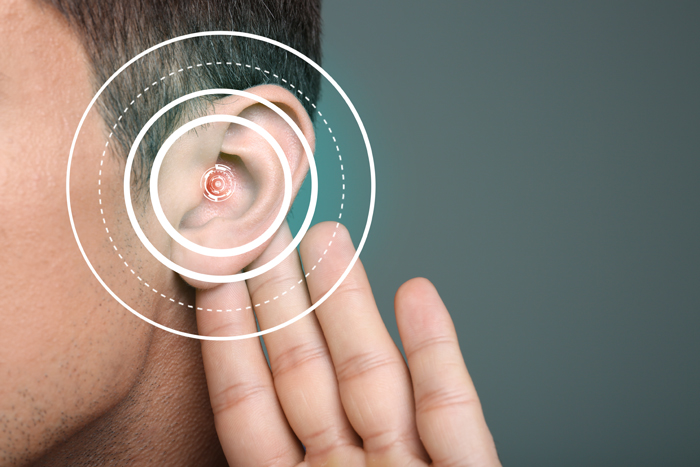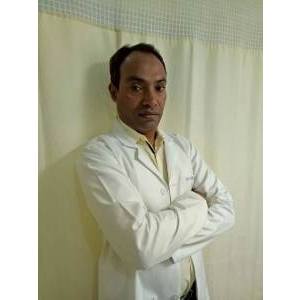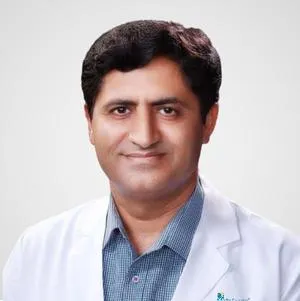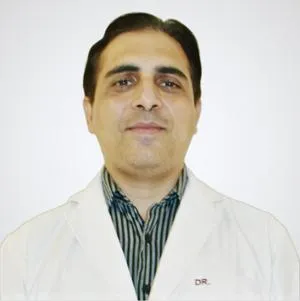Hearing Loss Treatment in Chirag Enclave, Delhi
Hearing loss or presbycusis occurs gradually with age due to chronic exposure to loud noises or excessive earwax. In many cases, hearing loss is irreversible. If you cannot hear sound around 30 decibels, this indicates hearing loss, and you must consult an ENT specialist near you.

What do we need to know about hearing loss?
Humans can hear sound waves of frequency ranging between 20 and 20,000 Hz. Hearing loss implies total or partial inability to hear sounds in the audible frequency range. If you are unable to hear sounds of the following intensity, then it indicates the extent of hearing loss, and you must consult an ENT specialist in Delhi:
- Mild hearing loss: 26 - 40 decibels
- Moderate hearing loss: 41 - 55 decibels
- Moderate to severe hearing loss: 56 - 70 decibels
- Severe hearing loss: 71 - 90 decibels
- Profound hearing loss: 91- 100 decibels
What are the types of hearing loss?
- Conductive – It involves the outer ear or middle ear
- Sensorineural – It involves the inner ear
- Mixed – It involves all parts of the ear
- Unilateral or bilateral – Hearing loss in one ear or both ears
- Congenital or acquired – Present at birth or develops later in life
- Symmetrical or asymmetrical – Same hearing loss in both the ears or different in each ear
- Pre-lingual or post-lingual – Hearing loss before a child starts speaking or after speaking
- Progressive or sudden – If it worsens with time or happens suddenly
What are the symptoms of hearing loss?
- Muffled speech
- Difficulty in understanding words
- Delayed speech in children
- Trouble hearing consonants
- No response to sound
- Need to turn up the volume of TV and radio
- Withdrawal from conversations
What causes hearing loss?
Here are some of the reasons:
- Aging decreases the elasticity of the ear
- Loud noise can lead to noise-induced hearing loss
- Infection due to the building up of fluid in the middle ear
- Perforation of the eardrums due to exposure to loud sound or pressure
- Abnormal bone growth or tumor
- Cholesteatoma – collection of skin inside the middle ear
- Meniere’s disease
- Malformed ear
- Cytomegalovirus
- Meningitis
When do you need to see a doctor?
If you notice hearing loss in an infant or yourself, particularly in one ear, you must visit an ENT specialist near you. Based upon your diagnosis, an ENT specialist in Delhi will suggest the treatment option.
Request an appointment at Apollo Spectra Hospitals, Chirag Enclave, New Delhi.
Call 1860 500 2244 to book an appointment.
How is hearing loss diagnosed?
It is necessary to assess the extent of hearing loss. An ENT specialist near you will use different
diagnostic tools to detect the presence and intensity of hearing loss.
- Otoscope – It examines damaged eardrums, infection in the ear canal, earwax accumulation, blockage by pathogens or foreign particles or fluid accumulation inside the ear.
- Tuning fork test – It uses a tuning fork (a metal instrument that produces sound when struck) by placing it against the mastoid bone behind the ear.
- Audiometer test – It uses various tones and decibel levels to understand the intensity of hearing loss.
- Bone oscillator test – It passes vibrations through the ear ossicles to evaluate the functions of the nerves that carry signals to the brain.
- Otoacoustic emissions (OAE) test – It uses a probe to check the echo sounds bouncing back from the ear in newborns.
What are the risk factors?
Hearing loss can lead to depression and isolation in adults, resulting in a decline in self-confidence. Various risk factors associated with hearing loss include:
- Loud noise – occupational noise or recreational noise
- Aging
- Heredity
- Medications like antibiotics or chemotherapy drugs
How is hearing loss prevented?
- Go for hearing tests in old age
- Cover your ears with earplugs or earmuffs
- Remove earwax regularly and carefully
- Check chemotherapy drugs and antibiotics for risks of hearing impairment
How is hearing loss treated?
Treatment for hearing loss depends upon the cause and the severity.
- Hearing aid – It is a small device that amplifies the sound waves received by your ears and thus helps in proper hearing.
- Surgeries – Surgical procedures treat hearing loss caused by abnormalities in the eardrum or the bones and drain out the fluid collected inside the ear.
- Cochlear implant – It treats hearing loss caused by damage to the hair cell in the cochlea.
Conclusion
Other than genetic conditions, your lifestyle is one of the main causes of hearing loss. It is essential to avoid unnecessary noise and maintain hygiene of the ear.
Yes, you can restore your hearing naturally by exercising, consuming vitamins, quitting smoking, and proper and careful removal of earwax.
You must eat magnesium-rich food like dark chocolate, pumpkin seeds, whole grains, avocados, spinach and bananas to keep your ears healthy.
Sensorineural hearing loss is a result of damage to hair cells in the cochlea. A cochlear implant can treat this hearing loss.
Symptoms
Our Doctors
DR. NAYEEM AHMAD SIDDIQUI
MBBS, DLO-MS, DNB...
| Experience | : | 14 Yeras Experience |
|---|---|---|
| Speciality | : | ENT, Head and Neck S... | Location | : | Chirag Enclave |
| Timings | : | Tue, Sat: 11:00 AM ... |
DR. ASHWANI KUMAR
DNB, MBBS...
| Experience | : | 9 Yeras Experience |
|---|---|---|
| Speciality | : | ENT, Head and Neck S... | Location | : | Chirag Enclave |
| Timings | : | Thur : 9:00 AM to 10... |
DR. AMEET KISHORE
MBBS, FRCS - ENT(Gla...
| Experience | : | 25 Yeras Experience |
|---|---|---|
| Speciality | : | ENT, Head and Neck S... | Location | : | Chirag Enclave |
| Timings | : | Thur : 9:00 AM to 10... |
DR. S C KAKKAR
MBBS, MS (ENT), DLO,...
| Experience | : | 34 Yeras Experience |
|---|---|---|
| Speciality | : | ENT, Head and Neck S... | Location | : | Karol Bagh |
| Timings | : | Available by prior a... |
DR. SANJIV DANG
MBBS, MS (ENT)...
| Experience | : | 34 Yeras Experience |
|---|---|---|
| Speciality | : | ENT, Head and Neck S... | Location | : | Karol Bagh |
| Timings | : | Mon - Sat : 9:00 AM ... |
DR. SORABH GARG
MBBS, DNB (Anaesthes...
| Experience | : | 16 Yeras Experience |
|---|---|---|
| Speciality | : | Pain Management... | Location | : | Karol Bagh |
| Timings | : | Mon - Sat : 9:00 AM ... |
DR. RAJEEV NANGIA
MBBS, MS (ENT)...
| Experience | : | 29 Yeras Experience |
|---|---|---|
| Speciality | : | ENT, Head and Neck S... | Location | : | Karol Bagh |
| Timings | : | Tue, Sat : 12:00 PM ... |
DR. R K TRIVEDI
MBBS, DLO, MS (ENT)...
| Experience | : | 44 Yeras Experience |
|---|---|---|
| Speciality | : | ENT, Head and Neck S... | Location | : | Karol Bagh |
| Timings | : | Wed, Fri : 12:00 PM ... |
DR. LALIT MOHAN PARASHAR
MS (ENT)...
| Experience | : | 30 Yeras Experience |
|---|---|---|
| Speciality | : | ENT, Head and Neck S... | Location | : | Chirag Enclave |
| Timings | : | Mon, Wed, Fri - 9:00... |
DR. PALLAVI GARG
MBBS, MD (General Me...
| Experience | : | 17 Yeras Experience |
|---|---|---|
| Speciality | : | Gastroenterology... | Location | : | Karol Bagh |
| Timings | : | Mon - Fri : 8:30 AM ... |
DR. CHANCHAL PAL
MBBS, MS (ENT)...
| Experience | : | 40 Yeras Experience |
|---|---|---|
| Speciality | : | ENT, Head and Neck S... | Location | : | Chirag Enclave |
| Timings | : | Thur, Fri : 11:00 AM... |
DR. MANNI HINGORANI
MBBS, MS (ENT)...
| Experience | : | 13 Yeras Experience |
|---|---|---|
| Speciality | : | ENT, Head and Neck S... | Location | : | Chirag Enclave |
| Timings | : | Mon & Thur : 11:00 A... |
DR. SANJAY GUDWANI
MBBS, MS (ENT)...
| Experience | : | 31 Yeras Experience |
|---|---|---|
| Speciality | : | ENT, Head and Neck S... | Location | : | Chirag Enclave |
| Timings | : | Tue, Fri : 5:00 PM t... |
DR. MANISH GUPTA
MBBS, MS (ENT)...
| Experience | : | 23 Yeras Experience |
|---|---|---|
| Speciality | : | ENT, Head and Neck S... | Location | : | Chirag Enclave |
| Timings | : | Mon, Wed: 12:00 PM t... |
DR. NITYA SUBRAMANIAN
MBBS, DLO, DNB (ENT)...
| Experience | : | 17 Yeras Experience |
|---|---|---|
| Speciality | : | ENT, Head and Neck S... | Location | : | Karol Bagh |
| Timings | : | Mon & Thur : 11:00 A... |
DR. ANAMIKA SINGH
BDS...
| Experience | : | 2 Yeras Experience |
|---|---|---|
| Speciality | : | Dental and Maxillofa... | Location | : | Chirag Enclave |
| Timings | : | Mon - Sat : 10:00 AM... |
Our Top Specialities
NOTICE BOARD
CONTACT US
CONTACT US
 Book Appointment
Book Appointment


















.svg)
.svg)
.svg)
.svg)








